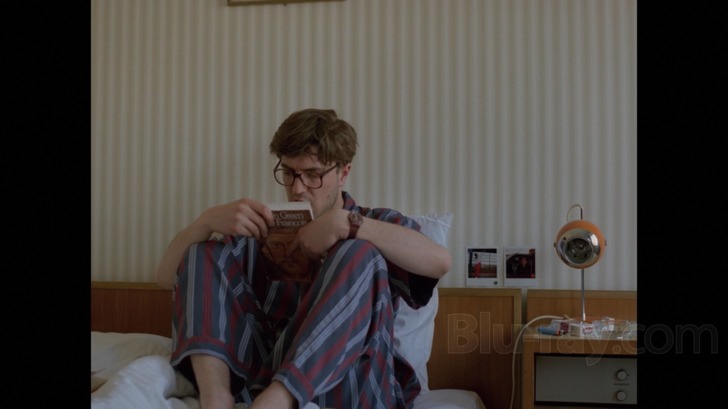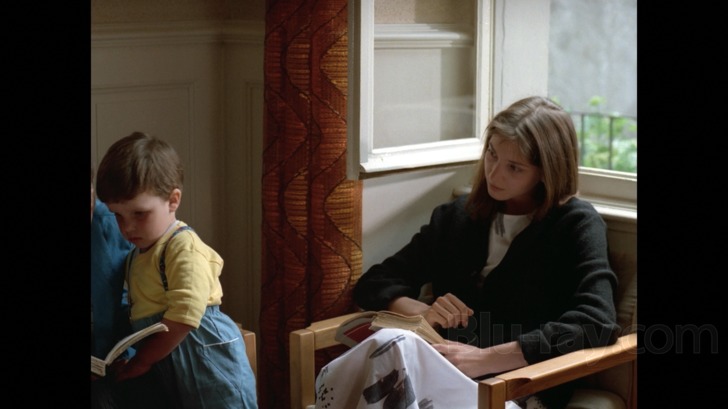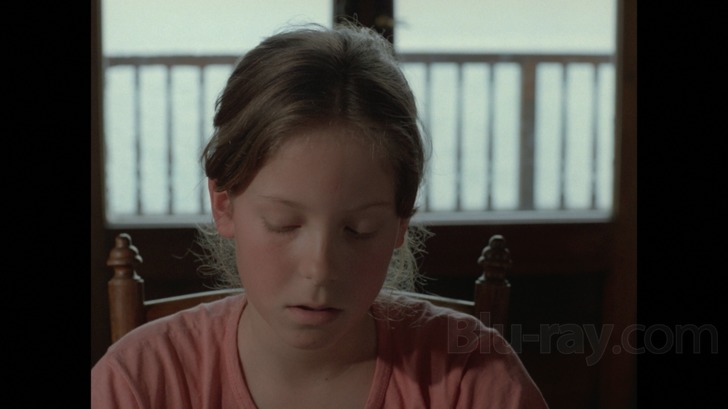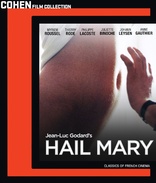Hail Mary Blu-ray Movie
HomeHail Mary Blu-ray Movie 
Je vous salue, MarieCohen Media Group | 1985 | 107 min | Not rated | Jan 07, 2014
Price
List price:Amazon: $19.99 (Save 50%)
Third party: $19.99 (Save 50%)
Only 11 left in stock (more on the way).
Movie rating
6.5 | / 10 |
Blu-ray rating
| Users | 0.0 | |
| Reviewer | 4.0 | |
| Overall | 4.0 |
Overview
Hail Mary (1985)
A present-day interpretation of the story of the virgin birth of Jesus. Teenage virgin Marie discovers she is pregnant, upending her life, including her chaste relationship with Joseph, a dropout and taxi driver. Meanwhile, in a parallel story, a university student and her professor secretly sleep together and debate philosophy.
Starring: Juliette Binoche, Myriem Roussel, Thierry Rode, Philippe LacosteDirector: Jean-Luc Godard
| Foreign | Uncertain |
| Drama | Uncertain |
| Dark humor | Uncertain |
Specifications
Video
Video codec: MPEG-4 AVC
Video resolution: 1080p
Aspect ratio: 1.33:1
Original aspect ratio: 1.85:1
Audio
French: LPCM 2.0 (48kHz, 24-bit)
Subtitles
English
Discs
50GB Blu-ray Disc
Single disc (1 BD)
Playback
Region free
Review
Rating summary
| Movie | 4.0 | |
| Video | 4.5 | |
| Audio | 4.0 | |
| Extras | 4.0 | |
| Overall | 4.0 |
Hail Mary Blu-ray Movie Review
Mother of God(ard).
Reviewed by Jeffrey Kauffman January 9, 2014Pope Francis has had a remarkable first year (more or less) as the leader of the world’s Catholics, offering a rather potent breath of fresh air to believers and non-believers alike, and raising a few hackles in the process. The Pope is rumored to tend to the poor anonymously, sneaking out of the Vatican at night without his vestments (and without that hard to miss “Pope hat”), and his recent statements about the Church’s focus on divisive issues and the world’s focus on the aggregation of wealth have set conservatives (of both the political and social persuasions) into near fits of reactionary hysteria. Time Magazine recently named Francis its Person of the Year, the first Pope to be so designated since 1994, when John Paul II received that particular recognition. John Paul II has since entered the ranks of sainthood, and is rightly viewed as one of the most epochal church leaders of all time, but it’s interesting to remember that he could at least occasionally be as reactionary as any modern day pundit when confronted with something that offended his sensibilities. Such was the case when Jean-Luc Godard’s Hail Mary premiered in 1985. John Paul II was not in the least bit shy in proclaiming the film an affront to those with a traditional religious belief system. It might therefore be instructive to screen Hail Mary for the latest Pope to see what Francis makes of this arresting but frankly disturbing (intentionally so, it should be stated) modern update of the story of the Virgin Madonna. Jean-Luc Godard has of course always seemed to enjoy his self-appointed role as provocateur and enfant terrible (no matter what his age), and if his earliest works are rife with the in your face insouciance of a know it all (relative) youth, there’s no less of that proclivity in many of his later works, albeit with a perhaps slightly moderated tone. Godard has attracted a cult as very few filmmakers have, and to those folks, the auteur can simply do no wrong. More objective types might argue that Godard’s oeuvre is at best a mixed bag, with some of his pieces so obfuscatory that they become downright annoying (again, probably intentionally so). Hail Mary is an interesting mid- to late career Godard that does not forsake traditional elements like narrative flow and character development while at the same time not shying away from some of Godard’s “typical” approaches like disjunctive editing and intellectual philosophizing.

So much attention is routinely paid to Jesus’ life that what Mary went through is almost an afterthought at times, even to the most devout Catholics who pray to the Holy Mother almost as much as they do to their Lord. Godard’s great conceit in Hail Mary is revisiting the story—albeit in typically discursive Godard fashion—in contemporary garb. Mary is here given the French name of Marie (Myriem Roussel), and is an innocent young teenager who has stayed celibate despite the frequent protestations of her taxi driving boyfriend Joseph (Thierry Rode). When a jet-setter named Gabriel (Philippe Lacoste) shows up and has Joseph drive him (and his child assistant) to the gas station where Marie works, Godard reveals his first sleight of hand. The annunciation is told almost obliquely—we hear Gabriel’s voice, but never see him. Instead Godard focuses briefly on Marie’s own confused face but then the camera captures scenes of the nighttime nature surrounding the activity. Again and again, Godard will depart from traditional framing and sound design, throwing the audience for several loops along the way. A scene will suddenly cut away to a seemingly unrelated visual image, or similarly, the soundtrack, which is often filled with classical works by the likes of Bach, will just as suddenly morph into cacophony, dialogue or nature sounds.
And this is perhaps the single biggest clue to what has become one of Godard’s most discussed films. Is Godard really just recasting this oft-told story in a different setting? Or is there (as there so often is) some kind of subtext here which the audience is meant to ferret out? The excellent commentary by Hal Hartley and David Schwarz wants to make a case that Godard is exploring ideas of feminism, as revealed in one of the lines by the film’s preamble, The Book of Mary, by Godard’s collaborator and partner Anne-Marie Miéville, where the parents of Marie are divorcing and Marie’s mother mentions that she doesn’t need to be dominated to understand her identity. And truth be told, Godard’s formulation of the story does tend to at least hint at female empowerment, especially as the increasingly frustrated Joseph can’t quite wrap his mind around what is happening to his fiancée, and even after the Holy Child is born, is still kept at arm’s length by his putative lover.
I’d perhaps argue that Godard’s approach here is a bit more general in nature, i.e., he is attempting to explore ideas of the feminine (even The Feminine), rather than its manifestation as actual feminism. Godard gives us all kinds of clues about this (as does Miéville, especially with the image of the egg which closes her section of this quasi- portmanteau. Godard gives us traditionally feminine images in abundance, things like the moon, water, beautiful blooming flowers—as if to generalize the story of a chaste feminine spirit still being able to erupt into bounty, perhaps even a bounty able to offer salvation.
That said, there’s certainly very definite religious content to the film, but rather ironically it’s perhaps just as evident in a parallel plot involving a kind of unctuous university professor (Johan Leysen) whom Godard casts in this drama as a fill-in for Satan. We once again hear an unseen person asking this character (who is framed in darkness) about being “exiled” for his beliefs, and there’s little question Godard wants us to infer that he is in some way Lucifer. This is especially interesting in that the professor discusses ideas very close to “intelligent design”, but also deals in matters scientific, establishing one half of the dialectic where the “faith based” Marie provides the counterbalance. Godard is also obviously concerned with the psychology of the story, hoping to elucidate the inner lives of both Mary and Joseph in sometimes, yes, provocative ways. Marie herself may be the object of derision as much as she is of veneration, and even the “Christ” child turns out to be aptly contrarian, perhaps (perhaps) a slap in the face to traditionalists, but probably just as likely only another example of Godard toying with convention.
While the film will seem positively quaint to those raised on more lurid fare which has been released over the past couple of decades, there’s a certain salacious aspect to Hail Mary which may have been the main reason Pope John Paul II found the film so problematic. While Godard’s lusting after Roussel is well documented, there may actually be a contextual reason for the obsession with Marie’s body. Godard is very subtly examining the disparity between carnal love and spiritual affection. Marie herself is only too aware that her body has become the vessel for a Divine interloper, but in a way the very core of her being has remained inviolate. Godard seems to be pointing out that beauty may be only skin deep, but the mysteries of the soul are unfathomable.
Hail Mary Blu-ray Movie, Video Quality 

Hail Mary is presented on Blu-ray courtesy of Cohen Media Group with an AVC encoded 1080p transfer in 1.33:1. This is a beautifully organic and natural looking transfer, one which preserves Godard's slightly diffuse cinematography without sacrificing clarity or detail. Colors are accurate looking, though it should be stated that this film doesn't really "pop" in any significant way. Instead, there are softer hues in abundance, like the soft pink of Dogwood blossoms or the burnt umber of a sunrise. The image here is very stable, with excellent contrast and absolutely no sign of over aggressive sharpening or denoising. While there are copious supplements on the disc, the BD-50 still provides plenty of room for the main feature, and I noticed no egregious compression artifacts.
Hail Mary Blu-ray Movie, Audio Quality 

Hail Mary's LPCM 2.0 track sports excellent fidelity, even though the sound design here is intentionally anachronistic and may seem jarring to some unacquainted with Godard's frequent abrupt changes. Things can occasionally sound kind of busy in this intentionally cacophonous mix, but are never crowded, with clear prioritization per Godard's whims. Dialogue is mostly clearly presented, though occasionally Godard is his usual trickster self and deprives the listener of a word here or there as the soundtrack moves on to something new.
Hail Mary Blu-ray Movie, Special Features and Extras 

- Notes on Hail Mary (1080p; 20:32) is a "video notebook" assembled by Godard in 1983, providing a fascinating glimpse into rehearsals and quasi-auditions. In typical Godardian style, note how this piece begins with a shot of Godard filming himself with a video monitor capturing all the action taking up most of the frame.
- JLG/MR (1080p; 17:27) is a 2010 interview with Myriem Roussel, who discusses Godard's fascination with her and the seemingly endless pre-production process (a whole other film was initially planned). She discusses some of the minutiae of the shoot as well.
- JLG/ADB (1080p; 14:38) is a 2010 interview with Antoine de Baecque, Godard's biographer. This is a really interesting piece and actually makes for a good starting place for those who might want a little roadmap going into this often opaque film.
- JLG/PR (1080p; 18:41) is a 2010 interview with Pierre Rissient, who worked with Godard on Breathless. This provides some interesting anecdotal data on what it was like to be on a Godard shoot.
- Original French Trailer (1080p; 1:53)
- 2013 Re-Release Trailer (1080p; 1:44)
- Feature Length Audio Commentary by Director Hal Hartley and Museum of the Moving Image Chief Curator David Schwarz. This is an extremely interesting and conversational commentary, though anyone looking for "ultimate answers" here will probably come away feeling disappointed, for the two friends seem as baffled by some elements of the film as "the rest of us". That said, they provide some nice insight here, including some funny observations like how often Godard leading men are named Paul and how Godard recycled shots in several films.
Hail Mary Blu-ray Movie, Overall Score and Recommendation 

I would never pretend to fully understand what Godard had in mind with regard to Hail Mary, nor why he insisted that Anne-Marie Miéville's short film be appended to his as a cinematic prelude, but Hail Mary actually is a Godard film that even Godard disparagers may like. While it's full of the auteur's playfulness, it's also relatively (relatively) straightforward, offering something akin to a "normal" narrative flow replete with understandable and compelling characters. There's still a bit too much overt intellectualism here for the film to actually be touching in any meaningful way, but it's at least as thought provoking as it is generally provocative. Cohen has offered up a bounty of special features and once again delivers a high definition experience of the highest technical merits. Highly recommended.
Similar titles
Similar titles you might also like

Raise the Red Lantern
Da hong deng long gao gao gua
1991

Pieta
피에타
2012

The Life of Oharu
西鶴一代女 / Saikaku ichidai onna
1952

Ordet
1955

India Song
1975

The Marriage of Maria Braun
Die Ehe der Maria Braun
1978

Loveless
Нелюбовь / Nelyubov
2017

Christ Stopped at Eboli
Cristo si è fermato a Eboli / Full-Length Version
1979

Thirst
Törst
1949

Brink of Life
Nära livet
1958

The Image Book
Le livre d'image
2018

Young & Beautiful
Jeune et jolie / Slipcover in Original Pressing
2013

When a Woman Ascends the Stairs
女が階段を上る時 / Onna ga kaidan wo agaru toki
1960

One Sings, the Other Doesn't
L'une chante, l'autre pas
1977

The Ballad of Narayama
Narayama bushikô
1983

Betty
1992

4 Months, 3 Weeks and 2 Days
4 luni, 3 săptămâni și 2 zile
2007

Umberto D.
1952

Through the Olive Trees
زیر درختان زیتون / Zire darakhatan zeyton
1994

Elles
2011
